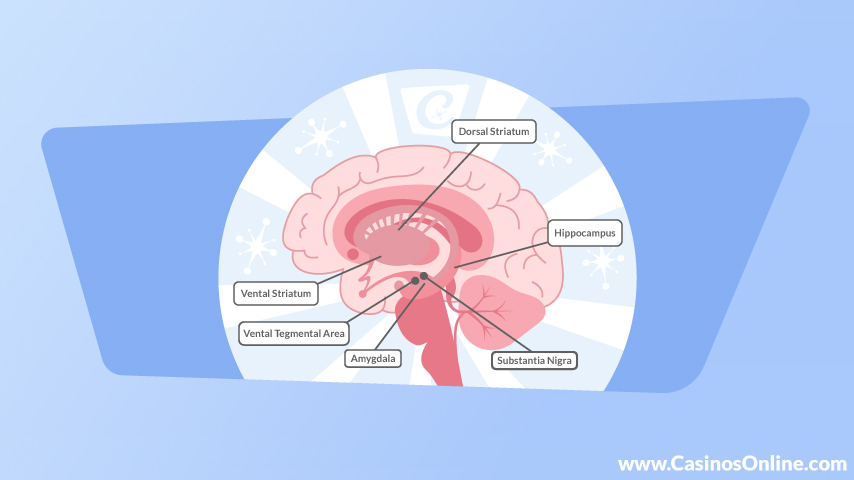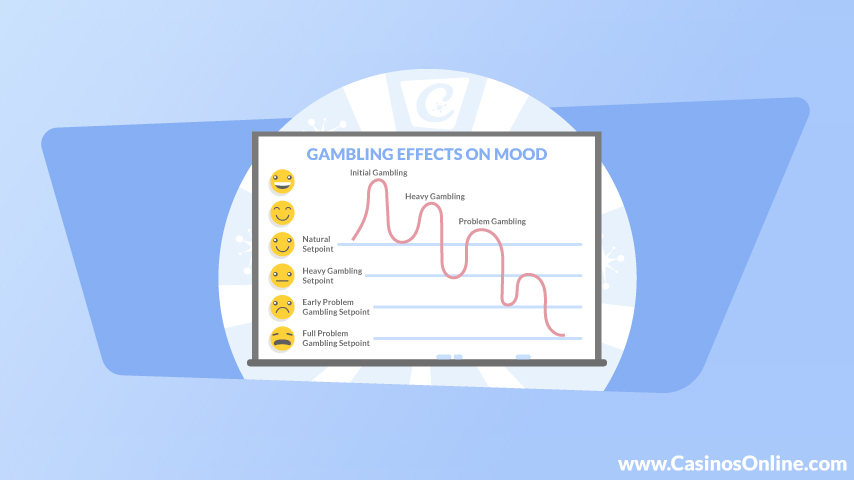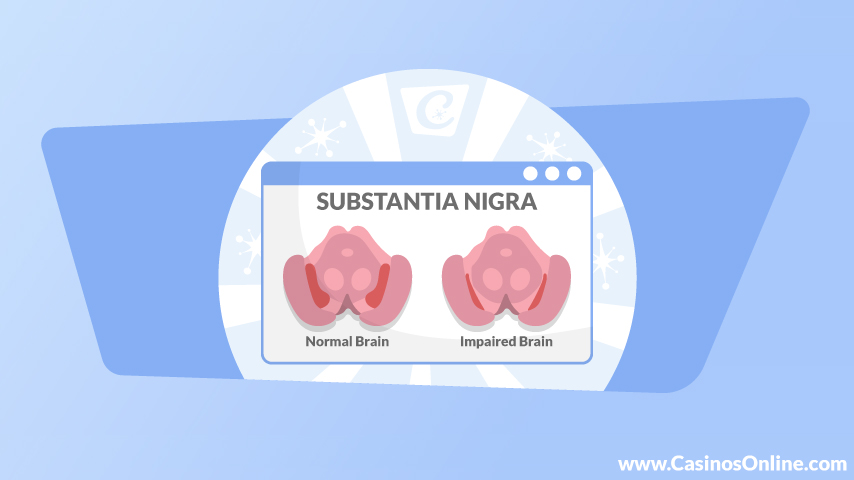
When you just start gambling, you feel like you're on top of the world. Winning comes easy and even losing doesn't feel bad.
Loaded with hormones, you seemingly have nothing to worry about. The longer one gambles, the more hooked they are, and often without even noticing it.
So, what is happening in your brain while you're gambling?
The Science behind Gambling
The Reward Central in our brains is called the ventral striatum. Located just behind our ears, it motivates us to go toward our goals and chase our desires.
On the other hand, the Top-Down Control Network or prefrontal cortex balances out the urges produced in the Reward Central. That said, we can deduce that having both regions of the brain active is necessary for healthy decision-making processes.
In regards to gambling, the Control Network tells gamblers to slow down and spend their money rationally.
Conversely, when there's a discrepancy between the activities of these two areas of the brain, addiction may occur. This is why gambling is so addictive.
As in life, controlling one's impulses results in an equilibrium between satisfaction and logic.

The trick, however, is that once one realizes that they have a gambling problem, they tend to have already been addicted. In turn, getting back on track can be strenuous work. But it's possible nonetheless.
Furthermore, medicine explains the link between gambling and dopamine in the following way. Namely, gambling triggers a chemical reaction in the ventral striatum which activates the production of dopamine. This brings the so-called gambling neurotransmitter in direct connection with the soi-disant “gambling high”.
However, this state of absolute pleasure, when overloaded, turns from Dr. Jekyll into Mr. Hyde. Find out more below.
Why Is Gambling Addictive
Here's how addiction spirals further.
The part of our brain called the dorsal striatum or the Habit Central is where our habits are formed.
In essence, gambling addiction is a habit. Habits are formed when brain activity slips away from conscious thought. Consequently, the person feels like they cannot control their actions. Ironically, once a person is addicted, gambling is no more fun – as it is supposed to be – but it's a burden that you seem not to be able to stay away from. Nevertheless, the addicted person continues to gamble to escape uncomfortable urges.
To an extent, problem gambling is comparable to obsessive-compulsive behavior, whereupon an individual keeps repeating certain actions just to muffle down the uncontrollable drives which push them towards gambling in our case.
The consequences of gambling are numerous and the gambling mindset is a confusing matter. Once you're in too deep, your everyday life is affected by your bad habit, too. Problem gamblers experience mood swings and tend to lash out at people around them without an apparent reason. They also tend to act out of character and fall into a limbo of constant despair because of their need to saturate the thirst for gambling.
The ventral striatum and the prefrontal cortex play vital roles in addiction development. An overwhelming number of external stimuli and the abuse of the ventral striatum backfire against the addicted person. Eventually, the player grows numb towards the casino gains or a lack thereof, and the reward hub no longer serves its purpose. Ultimately, rewards mean nothing to the addicted brain.
Psychological Effects of Gambling
In the following section, we explain what the inside the brain of a gambling addict looks like.
We know by now that gambling releases dopamine. A pleasurable activity of any sort, including video games, entertainment, and physical pleasures, activates the release of the “gambling neurotransmitter”. Substantia nigra, a midbrain area of the brain responsible for enhancing motivation, produces dopamine into the brain. As a result, humans on dopamine experience high levels of alertness and wakefulness.
However, the state of mind or gambling mindset changes once the reward hub is oversaturated.
Here's an illustration of how gambling may affect your mood.

Firstly, a newly registered gambler feels exhilarated and keen to place their first bet. As soon as their stakes start paying off and winnings come their way, the mood improves reciprocally. However, once an addiction settles in, mood levels drop and continue to fluctuate, causing a whirlpool of conflicting emotions in no specific order. Thus, the acting out-of-character we mentioned earlier.
As a result, gambling becomes less and less pleasurable over time. Additionally, even when not gambling, a problem gambler might experience negative feelings and low spirits.
Such strong emotions may lead to depression, anxiety, self-deprecating and intrusive thoughts, and an overall haphazard approach to life. In others, problem gambling might manifest in utter indifference towards the person's loved ones and activities they once enjoyed, gambling included. In turn, one's relationships are affected by problematic behavior and it all spirals down into a complete loss of control of one's life.
Tackling Gambling Addiction
But there's no need to panic. Getting informed about what gambling can do to you is the first step towards a healthy relationship with your hobby.
If you're at the beginning of your journey, welcome. We are glad that you are here and learning with us.
And if you're on the other side of the table looking for help, welcome, too. If you're worried you might be addicted to gambling, help is on the way. There is hope.
The good news is that our brains are always changing. Therefore, just as the mind became addicted to gambling, it can also be shifted back to its neutral state with some work and dedication. It is possible to reset one's reward pathways, and we have ventral striatum to thank for that. This portion of your brain can be easily regenerated with some effort.
However, it is crucial to seek gambling help so as to know how to build a healthy gambling mindset.
After all, leading a meaningful life is more important than anything else. And seeing you here is already is praiseworthy.
How Casinos Trick Players
While placing bets is supposed to bring players joy and money, there is a dark side to the industry. It is a public secret that casinos use different tricks to mislead players and get them to spend more.
From making you use chips instead of real money to modifying the environment, casinos contrive various traps for punters to fall into. Unfortunately, more often than not, they do, which is why you should know about the following ways casinos manipulate you into staying longer.
Altering Your Perception
Let’s start with the less obvious ways casinos trick players.
You might have noticed how much slot cabinets have evolved and changed over the years. Once bulky, inefficient machines, they are now playable by tapping a single button. No need to pull the lever of the good old one-armed bandit. Instead, a small switch takes care of the outcome of a slot game.
You might be thinking to yourself, “Slots are so convenient.” And they are. However, statistically, players are spending more money on this new model of slots in contrast to old-fashioned cabinets.
Overspending occurred on the account of practicality.
Additionally, it is common to witness gyrating lights across the slot machine screen and celebratory sound effects even if you’re objectively not winning much, or at all. For instance, you place $10, win $5, and the machine goes mad with blaring neon lights and party anthems. Therefore, players are often misled into thinking they are winners even when they are losing.
To battle this misconception, the UK Gambling Commission banned auditory or visual effects in slots unless the winning sum exceeds the stake. The said decision is yet to impact slots on a grand scale but it’s showing to be effective in the United Kingdom online casinos.
Physical Stimuli
Next up, we will be focusing on land-based casinos for a moment.
If you’re an observant person who’s ever been in a brick-and-mortar gambling venue, you might have successfully avoided creating a false gambling mindset. What we mean by this is that you can objectively perceive your physical environment and notice certain oddities about it.
To paint the picture, imagine yourself entering into a physical casino. You are immediately welcomed by flashy lights and appealing, upbeat or relaxing music. There are also people chattering, and dealers commenting at blackjack and poker tables. Moreover, the edifice is likely huge, which adds to the overall overwhelming sensory experience.
But the eagle-eyed among you will see something is not quite right in land-based casinos.
For some reason, there isn’t a single clock in sight. Or if there is one, it’s too far away for you to see it from your chair.
To see the time, you must physically walk towards the clock wall. And rarely are people in the mood for quitting their game to do such a mundane task as checking the time. Therefore, they keep playing with no idea how long they have been spinning and how much they have lost.
What’s more, in-person casinos usually lack windows completely. This way, casinos metaphorically blind you to evade objective perception of the world around you. This mind game might as well be illegal. But since it isn’t, it is up to you to be vigilant and protect yourself proactively.
Overwhelming Selection of Games
Other than covertly constricting your view of the objective world, casinos also introduce more evident ways of making you stay on the floor longer. The most obvious ace up their sleeve is the overwhelming choice of games to play.
Most casinos offer a staggering collection of games, encompassing slots, poker, roulette, blackjack, craps, and more. In turn, many players feel inclined to try all, or at least most of them. What that means is – these players will be staking more and thinking less.
And the longer you stay in a casino – land-based or online – the more tired you grow. But the damaged habit central (dorsal striatum) will keep you awake and interested in placing bets further.
A similar situation is seen in online casinos, where physical capacity does not limit their roster of games. Instead, online casinos may theoretically host an infinite number of games. Nowadays, most licensed online casinos cater to at least 1,000 titles.
It is not possible to play that many games in a lifetime, but an addicted brain might falsely think otherwise. And even if the addicted player manages to focus on a single game, they will likely continue overspending. This is why gamblers always lose eventually. At least undisciplined and uninformed ones.
Gambling releases dopamine, which is the primal drive beginner gamblers experience. But if left neglected or overdone, this urge can turn against the person. To stay safe while gambling, be wary of how long your gaming sessions last and create a bankroll in advance.

What Causes Problem Gambling?
By definition, science explores and describes causal relationships between studied subjects. Therefore, the science behind gambling must deal with the cause, as well as the effects of psychological effects of gambling.
Multiple critical factors contribute to developing an unhealthy relationship with gambling and dopamine:
- Hazardous, unsupportive environment
- Lack of knowledge about problem gambling
- Specific biological factors and brain conditions
- Genetics / Hereditary elements
- Cultural components
- Psychological disorders and conditions
Dangers of obsessive gambling usually come from ignorance. To exemplify, the Gambler’s Fallacy (also Monte Carlo Fallacy) is one of the most famous myths problem gamblers believe. The Gambler’s Fallacy refers to a false belief that the outcomes of a casino game are mutually dependent. Advocates of this casino myth fruitlessly seek order and cause in casino games of chance. Logically, such misconceptions lead problem gamblers into overspending, which is something every casino player should avoid. Why?
The illusion of control drives an addicted person into falsely trusting that luck is not as involved in winning at casinos as it factually is. Staying coolheaded and rational is recommended to anyone struggling with addictive propensities.
Gambling disorder or compulsive gambling is further explained on the official webpage of the American Psychiatric Association. In short, diagnosing compulsive gambling is primarily based on observing repetitive, obsessive needs for wagering higher stakes with no rational reason.
The most efficient way of treating gambling addiction is cognitive behavioral therapy (CBT). Additionally, counseling and family support greatly contribute towards a faster recovery.
Who Is at Risk?
Problem gambling may develop in anyone. But certain studies have shown that some demographics and ethnic groups are more prone to get addicted to gambling than others.
We categorized addiction-prone communities as follows:
- Teenagers & young adults
- Adults going through a midlife crisis
- Indigenous people
- First-generation immigrants
- Low-income individuals
- Persons with other underlining addiction-related problems
- Gender
Firstly, persons under the age of 18, as well as most young adults not older than 24 are rarely aware of the potential dangers of compulsive gambling. Due to emotional immaturity and lack of awareness, this demographic easily falls into a trap of unnoticed addiction. That is why prevention is key, especially when it comes to underage persons.
Moving on, cultural & ethical backgrounds statistically influence the way persons perceive problematic gambling.
Regarding the slightly controversial topic of indigenous problem gamblers, we must highlight certain figures. Namely, a healthy gambling mindset is rarely developed among Indigenous communities in Canada. As seen in this article by Williams, racial discrimination is an underlying factor for problem gambling in Canadian Indigenous groups.
Studies also show that addiction-prone individuals such as alcohol- and drug-addicted persons are likely to develop an uncontrolled liking of gambling.
Lastly, numerically there are more men addicted to gambling than their female counterparts.
Even so, various factors affect the development of an addiction. The fact is that by default some groups of people are inclined towards addictive behavior. But these statistics shouldn’t worry you. Instead, they should serve as a word of warning and help you prevent dangerous behavior should you find yourself in a complicated situation.
How to Prevent Problem Gambling
As soon as you notice you’re more preoccupied with gambling than you used to, it might be the first sign to ask for help.
Here are common symptoms in the early stages of developing compulsive gambling:
- Spending more and more time thinking about gambling
- Gradual increase in your stakes
- Getting frustrated or angry when your dear ones ask you about your problem
- Unsuccessfully controlling your gambling habit
- Feeling unfulfilled when not gambling
- Neglecting your relationships to foster addictive behavior
- Rejecting help from friends and family
- Asking for loans so as to maintain your casino bankroll
If you’re experiencing any of these symptoms, it’s wise to consult an expert or ask a family member for support. Please reach out to support groups or a national council on problem gambling in your country.
Additionally, you may also want to activate anti-gambling software to prevent problem gambling in online casinos.
Staying Safe in Online Casinos
In conclusion, the evolution of internet gambling has opened the door to a different type of potential addiction. However, prevention is quintessential here as well and is more easily executed than one might think.
To stay safe in digital casinos, one must employ further measures.
First of all, educating oneself on responsible gambling is the first step. Understanding the importance of sensible actions hinders chronic gambling issues.
Secondly, separating legit, trustworthy online casinos from rogue ones can also be learned in advance. Make sure to check out our detailed guide on choosing the right casino before you gamble online.
Gambling safely on the web is no different from staying safe online in general. Use relevant software, do not register at shady web pages, and don’t share your personal data with blacklisted sites.
Finally, problem gambling can be both prevented and treated. But perhaps it’s equally important to realize the way gambling neurotransmitters work and to develop a healthy relationship with our hobbies. A “gambling brain” does not have to be a pejorative term.















